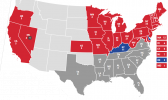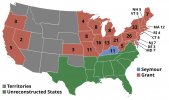"The beginning of the special election process started around May of 1865. It's well known that congress had agreed to hold one just days after the Triple Calamity under the 1792 Succession Act, but the gears of bureaucracy didn't begin turning until mid-May when the State Department alerted the union of it's imminence. A few days after the state governments were warned, local news was informed and thus the people were as well. The first headache that came with the announcement of the special election was continued violence throughout the states still in rebellion. Many southern whites became quite infuriated at the notion that they would not be voting. Some of these men ended up joining local confederate garrisons (or early White Leagues), to take out their anger, which once again prolonged the war in the south. President Foster had initially hoped to declare the war's end in late May, yet the influx of new confederates post-election announcement caused the President to postpone his declaration until July."
-
From Resentment in Dixie
by Peter Barnett, published 1927
"The general election was a foregone conclusion. It was clear to everyone that the Democratic Party, no matter how hard it tried, would lose. The only question was by how much. The truth is with every southern state removed from the election and the national mood firmly in republican hands even the border states weren't assured Democratic wins. This meant that the real
election was going to be the Republican nomination process. Many candidates threw their hats into the ring. Schuyler Colfax the Speaker of the House was first. He said that should he be elected, congress would have free reign over reconstruction. That was appealing to many. Then there was Hannibal Hamlin, the former Vice President encouraged his friends to offer his name to the convention. Hamlin ran on a return to the first "true" republican administration under Lincoln. Then there was Salmon Chase, Lincoln's old Republican rival.
All three of these men were expected and somewhat boring. Sure if nominated they would win. Yet they weren't inspiring. Some urged President Foster to run for a proper election. He adamantly declined any offer. However, many moderate Republicans seeing the field full of "radicals" decided they would push for Foster anyway unless there was a better alternative. Some people believed they had found that better alternative.: Ulysses S. Grant.
For the better part of a year General Ulysses S. Grant had been constantly pestered over politics. Reporters would consistently try to find out if Grant was a Republican or Democrat. In June, just a week before the Republican National Convention (planned to be held in Springfield, Illinois to honor the late President Lincoln) Grant affirmed he was a Republican to the press. "I generally lean more towards that side of the boat. Yes."- Grant said in response to a reporter asking if he leaned Republican. Grant thought he was safe. He didn't say he was a Republican just that he leaned towards them. Either way, that was enough for most of the party to see Grant as the perfect candidate."
-
From GRANT
by Howell Leanman, published 1977
| Presidential Ballots | 1 | 2 | 3 | 4 | Vice Presidential Ballots | 1 | 2 |
| US. Grant | 198 | 301 | 315 | 488 | H. Hamlin | 222 | 378 |
| L. Foster | 150 | 150 | 150 | 152 | S. Colfax | 178 | 22 |
| S. Colfax | 118 | 117 | 112 | 10 | R. Fenton | 150 | 155 |
| H. Hamlin | 96 | 0 | | | N/A | 0 | 0 |
| S. Chase | 88 | 82 | 73 | 0 | N/A | 0 | 0 |
"These were the final results of the 1865 Republican National Convention in Springfield, Illinois. The first ballot set the tone almost immediately. Most of the delegates upon seeing the early Grant lead began to make deals with the people who voted for Grant. The funny thing is the delegates that voted for Grant didn't really know his political views, few knew the man at all. Thus 198 republicans got anointed as campaign managers for a man they had never really met. They were a mix of moderates and radicals so over the course of the convention, Grant was portrayed as a man who supported Land Distribution yet also supported the immediate readmission of all southern states. As voting on the second ballot got closer and closer, the radical Grant supporters promised the Hamlin men the Vice Presidency. Some moderate Grantite men were off put by this. After all, Hamlin was a radically inclined man from Maine. That said, Hamlin might also inspire the American people as he was the former Vice President under Lincoln, making him almost a return to normalcy. (An odd thought considering he was Vice President in the thick of the war.) Either way, with Hamlin encouraging his men to flip to Grant, the conclusion was foregone. After some radical flips on the third ballot it became very clear that Grant would be nominated. On the 4th the rest of the radicals hopped on board with Grant.
Interestingly enough, the actual man that had just been nominated as the Republican nominee had absolutely no clue. Grant had been informed that some delegates were going to put his name forward, but in Grant's mind there was no way that rich politicians would choose him over the President of the United States or the Speaker of the People's House. Yet on June 22nd, the same day as the convention, Grant was given a message via telegram at his father's house in Cincinnati. Jesse Root Grant read the message first and nearly had a heart attack. He sent his boy to the train station that night headed to Illinois.
Back in Springfield it was time to nominate the Vice President. The choices were Hamlin for the Grant men and moderate radicals, Colfax for the radical radicals and Ruben Fenton, a former democrat from New York who was nominated by the moderate faction. It didn't take long for Hamlin to be nominated fulfilling the Grant supporters' promise.
The next day Grant arrived in Springfield. He met his new Vice President and walked into a room full of cheers and banners. Grant would later write that "The Republican National convention felt more like a coronation to the Presidency than a nomination as the Republican Party's choice to the Presidency...
| Presidential Ballot | 1 | 2 | 3 | 4... | ...35 | 36 | 37 | Vice Presidential Ballot | 1 |
| H. Seymour | 22 | 0 | 1 | 5 | 144 | 151 | 240 | G. Pendleton | 159 |
| G. Pendleton | 55 | 133 | 112 | 103 | 54 | 66 | 2 | WS. Hancock | 158 |
| WS. Hancock | 26 | 69 | 99 | 122 | 103 | 77 | 20 | N/A | |
| Numerous Others | 214 | 115 | 105 | 97 | 16 | 23 | 55 | N/A | |
Not nearly as many people focus on the Democratic National Convention during the special election. That makes sense considering the outcome of the general election, but the 1865 Democratic National Convention was very interesting. Of the fifteen candidates in contention for the nomination only three actually wanted to become the nominee. Of those three only one, George Pendleton had a shot to get the nomination. Everyone within the hall knew that the democrats would lose the special election and so we had the interesting circumstance of candidates telling delegates not to vote for them. Chief among them was Horatio Seymour. On the first ballot 22 people voted for Seymour. He loudly told them to flip their votes. After that it seemed like Pendleton was on the road to victory. This scared a lot of delegates who had a bad taste in their mouth when it came to Pendleton because he had been George McClellan's Vice President a year prior and McClellan lost big against Lincoln.
This led to Winfield Scott Hancock taking the lead. After all, a war hero may be their only shot against Ulysses Grant. Yet many democratic career politicians believed that Hancock had no experience and stood for nothing. Plus Hancock himself didn't want to be nominated. Even though Pendleton and Hancock were frontrunners, both were unappealing. Many delegates hopped ship to alternatives. Thomas Hendricks, James English, Stephen Field and more. This caused continuous deadlocks for over 30 ballots.
Eventually many saw Seymour as the only hope. He had been slowly gaining, but many candidates threw their supporters to him once it seemed like they would become front runners themselves. By the 36th ballot, it seemed like there were still 100 to go. Yet Pendleton urged his supporters to vote for Seymour. Historians still debate over why. Perhaps he realized his win was impossible and he was ready to be done. As the Pendleton supporters flipped their votes many Hancock enthusiasts did the same seeing the end as near. Seymour himself reportedly shed a tear upon realizing he would be the nominee. He gathered himself and begrudgingly accepted after realizing he had no choice.
Then came the Vice Presidential balloting. The convention hall was tired and in an attempt to get things done fast they made it clear that the choice was either Pendleton or Hancock. Pendleton was furious, saying, "I refuse to be the Vice President to another landslide loss!" He urged his supporters to vote for Hancock. Hancock however, also desperately didn't want to be Vice President seeing it as a career death sentence. He urged his supporters to vote for Pendleton. After a chaotic ten minutes, by one vote, Pendleton won and Hancock breathed a sigh of relief."
From Every National Convention in American History
by Jacob Cohen, published 2012
"As for the 1865, uh campaign... Well, it wasn't much of a campaign. Seymour and Pendleton practically hid from any kind citizen asking questions and few democratic surrogates were interested in any active campaigning. Meanwhile, Grant and Hamlin's surrogates presented a vote for the Republican Party as a vote for the memory of Lincoln, Seward and Johnson. They waved the bloody rag and blamed the war on the Democrats. I mean... It wasn't a surprise who won that year."
-From The Civil War Show
Starring Special Guest Kieren Hutchinson, radio episode premiered June 22nd 1988
View attachment 848140
View attachment 848141
Hope that wasn't a surprise to anyone. Tomorrow's chapter is gonna be about the real beginning of a very different reconstruction so get hyped. Feel free to comment predictions or critiques. Keep an eye out for chapter


